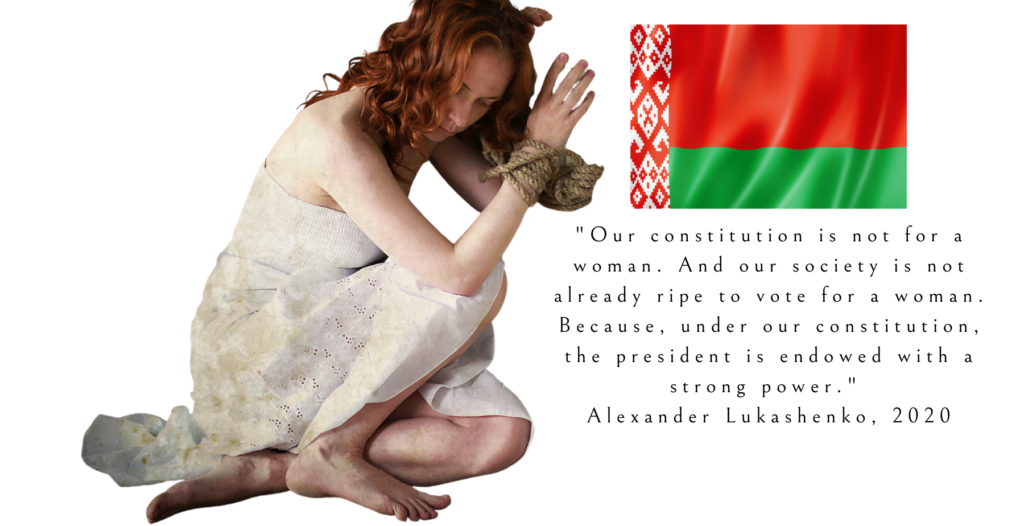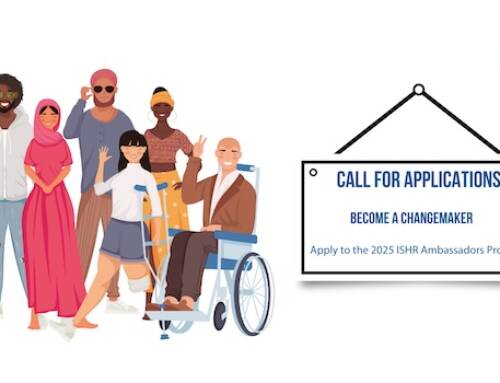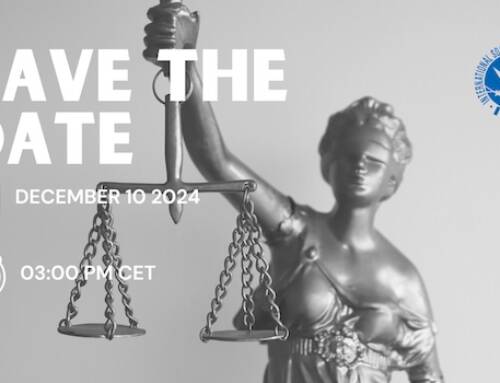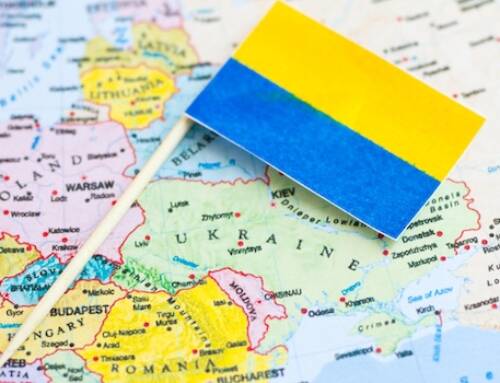

Editorial
Dear friends and partners of ISHR,
Women are often the most severely affected sufferers from wars, conflicts and global crises such as climate change – challenges well known and repeatedly emphasized on every International Women’s Day on March 8 of every year. For example, studies show that women are disproportionately affected by the negative impacts of climate change. On the one hand, this reflects the long-standing effects of sexism and institutionalized inequalities in the world. For another, it further reinforces them. Women around the globe are 14 times more likely to die in climate events and four times more likely to be displaced as a result of climate change. This is the conclusion of the April 2022 report “Accelerating the Race to Net Zero Through Gender Equity”.
Re-emphasizing the injustice and persistent inequality that women and girls face regularly and systematically around the globe is the goal and content of this year’s International Women’s Day. In 2023, the global day’s theme is “DigitALL: Innovation and technology for gender equality” which aims to bring the devastating impact of the digital gender gap on widening economic and social inequalities into the focus of global discussion. The main theme of International Women’s Day thus picks up on the priority theme of the sixty-seventh session of the Commission on the Status of Women (CSW67) that takes place from 6 to 17 March 2023, which is “Innovation and technological change, and education in the digital age for achieving gender equality and the empowerment of all women and girls”.
On the occasion of International Women’s Day 2023 and CSW67, we publish this issue-focused newsletter that brings together different perspectives on the persistent issue of lack of gender equity around the globe. We welcome all contributions from our global network of ISHR national sections and working groups, as well as from our secretariat staff and other authors who collaborate with us. Our ISHR secretariat staffer Martin Musiime asks after the recent presidential and parliamentary elections in Nigeria on February 25 and 26, 2023: “Where are the women in Nigerian politics?”Our guest author Jamada Kalinda Musa has put on paper his reflections on what we owe to the courageous contributions as well as the determined struggles and defiance of numerous women in our societies and concludes, “As a young man, I stand on the shoulders of great women”. And exiled Belarusian human rights defender Olga Karatch informs about the ‘Runaway slave-women’ who are currently under attack of Belarusian dictator Lukashenko in Lithuania.
Also looking at ISHR‘s worldwide network we can conclude: It is courageous and fearless women in numerous places who are the carriers, promoters and implementers of our human rights work – whether as section leaders or human rights defenders, from Armenia (Bella Shikaryan) to Kenya (Wanjeri Nderu) and from Pakistan (Aneeqa Anthony) to Latin America (Haydee Marin). Many of them and numerous other colleagues, partners, and companions of our work contributed to ISHR’s global social media campaign on the occasion of International Women‘s Day 2023, which, in light of the protests against the inhumane regime in Iran that has been particularly harsh on women in the country, is titled “Woman.Life.Freedom” (the well-known slogan and hashtag that gained worldwide attention in the fall of 2022 as a result of the violent death of Jina Mahsa Amini in police custody on September 16, 2022).
In addition to the focus topic “Women”, we bring you further news and insights from our work. For example, Dr. Carmen Krusch-Grün informs you about the imposition of a 10-year prison sentence on the 60-year-old Nobel Peace Prize winner, Dr. phil. Ales Bialiatski, in Belarus. And Antonio Lopez (Board of Directors of ISHR Nicaragua) and Haydee Marin
(Vice President ISHR Latin America) provide insights into the plight of imprisoned Rolando Alvarez in Nicaragua, whom they call the “Bishop with an iron will.”
Thank you for your continued support of our work. I hope you enjoy reading our latest newsletter.
With best regards

Thomas Paul Schirrmacher
President – ISHR

Matthias Boehning
Secretary General – ISHR
Nigeria: Where are the Women in Nigerian Politics?

Women comprise approximately 50% of Nigeria’s 210 million population and about 47% of the voters. Interestingly, of the almost 10million new registered voters, about 6.2 million are women. Whereas the numerical strength of women in Nigeria is not negligible, we inquire whether this is represented in the decision making rooms.
Women: On the Shoulders of Great Women

“But if the women gather together here—the Boeotian women, the Peloponnesian women, and ourselves—together we’ll be able to rescue Greece.” Lysistrata.
Belarus: ‘Runaway Slave-Women’ of Belarusian Dictator Lukashenko under Attack in Lithuania

“Our constitution is not for a woman. And our society is not already ripe to vote for a woman. Because, under our constitution, the president is endowed with a strong power.” Alexander Lukashenko, 2020
ISHR: International Women’s Day
To mark this year’s International Women’s Day, the International Society for Human Rights has collected voices from around the world to issue a unified statement of support for the women’s movement in Iran: “Woman.Life.Freedom.” Please support our message by raising your voice as well and writing the words “Woman.Life.Freedom” in your language or speaking them in a short video clip.
Donate: Every Cent Counts
Thanks to donors like you, we’ve made remarkable progress this year—but we also have a long way to go. We’ll need your voice and your generosity to continue our work and create inclusive campaigns like the one above.
By clicking the DONATE button below and giving today, you take action to support and promote the work we do around the world.
We are so grateful for your continued partnership, advocacy, and commitment as we continue on our journey to making the world a better place.
Belarus: The Outcry Must not Remain Unheard

The International Society for Human Rights urges the EU to intensify support for the Belarusian democracy movement. This is not only necessary for moral reasons, but also strengthens the negotiating position of the Ukrainians against Putin’s Russia.
Bolivia: Church Considered “Suspicious” After Peace Mediation

The archbishop of La Paz, Percy Galván, assessed the summons in connection with coup allegations as an attempt at intimidation.
“We saw this in Nicaragua, where a bishop was imprisoned because he did not want to take on going into exile.”
ISHR: Ambassador Volunteer Program

The Volunteer Brand Ambassador program adheres to the spirit of “start early and target when young.” to build a strong Human Rights community across the world while making the world a safer place for all.
Woman: Bernadette’s Prayer

This poem is based on the true story of Jean Pierre and Bernadette Adams. Bernadette Adams gave the world an example of dedication and love in her continuous care for her husband. He spent 39 years in a persistent vegetative state following an anesthesia accident during an operation on one of his knees in 1981.
Women: Some of the Phenomenal Women who have Inspired and Contributed to the Work of ISHR

In its activities, the International Society of Human Rights has worked with inspiring women from all over the world. These women have added value to our work, we are proud to learn from them. In this article, we profile a few of these distinguished women.
Iran: Saheb Fadaei is Free

At the age of 19, the convert was first arrested at a house church meeting and imprisoned in the notorious Evin Prison from November 2017 to May 2018. On February 27, 2020, she was released on bail – but she was not yet out of danger.
Pakistan: Tighter Blasphemy Laws put Even More Pressure on Minorities

Critical, amusing or derogatory statements about companions or relatives of the Islamic prophet Mohammed are to be punished even more severely in Pakistan in the future. On January 17, Pakistan’s National Assembly passed an amendment to the law, which stipulates that such offenses will be punishable by a minimum of ten years’ imprisonment instead of the current three years.





